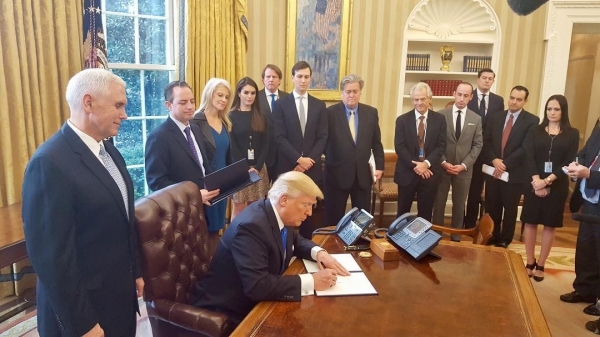When Dick Cheney and the Koch Brothers say that a new White House executive order on immigration has gone too far, that just might be an indication that our new president has gone too far.
Less than two full weeks into his presidential term - after a firehose of spectacularly horrible executive orders and policy changes, all executed ham-handedly - Donald J. Trump might have done what so many lesser people could not: unite the majority of a bifurcated country.
Trump voters in the region were far from the majority in this, the deepest blue area of Vermont, but we would like to think that most of those who voted for the president did so for a number of sane reasons with the clearest hope that he would exercise a different sort of leadership.
Despite any number of other warning signs, many Trump voters nationwide genuinely believed that they were choosing a tell-it-like-it-is, swamp-draining, law-and-order, run-government-like-a-business kind of guy whose unconventional political background would end up being a force for good in the world.
What they got is something altogether different.
And what all of us - Democrat, Republican, or otherwise - have now is a huge problem.
* * *
In the days, weeks, and months to come, the United States of America will undoubtedly undergo domestic turmoil of the sort that this country hasn't seen since the Vietnam era.
And with law enforcement defying multiple federal judges in their stays of Trump's executive orders, with an acting attorney general standing firm in refusing to defend this policy, with Trump firing her as a result, it is clear that we will face a constitutional crisis that this country hasn't seen since the Watergate scandal.
It's a matter of speculation and debate whether some or all of these actions were designed to set off chaos, or whether that turmoil came as the result of inexperience and ineptitude. And in the end, does it really matter?
Trump is unfit for office, and he has surrounded himself with a cabal of venal and unqualified acolytes. His actions and those of his inner circle threaten to destabilize the United States in the global arena. For all Trump's rhetoric about fighting ISIS, the extremist group is already using the transparently disguised “Muslim ban” as a recruitment tool.
Governor Phil Scott's Sunday statement condemning the Trump immigration orders provides a thoughtful, compassionate, and principled model for his Republican party. But Scott is the exception these days, not the rule. The silence on the national level of the Republican party - with few exceptions - is shameful.
Are Republicans in the halls of Congress so far gone that they are still willing to put party over country, even as the consequences of these extraordinary circumstances come into focus?
* * *
In the meantime, every day becomes a stark, real-world civics lesson. And every day is bringing overwhelming change into our world.
Citizens are stepping up to call out an administration for this behavior in a heartening display of conviction and solidarity. Organized groups are emerging to put unrelenting pressure on politicians. Donations are pouring in to the American Civil Liberties Union. Investigative news outlets and their journalists are reinvigorated, drawing strength from the backlash against the contempt and slander of the new administration that is positively Orwellian in its relentless, stubborn, and sloppy promulgation of delusion and fantasy.
The more polarizing policy that emerges from the White House, the greater the possibility that such policy will be met with an equal and opposite reaction from the people of this nation. These efforts - and the speed with which they are organized - are heartening.
But the more rancor that comes from this constant process of resistance, the more questions arise.
What happens afterward, when we all can turn our attention to our own lives and livelihoods?
Will we retain our country's proud values and principles but fracture our own community in the process?
Will we have patience with our family, friends, and loved ones who hold different philosophies? Will we leave room in our hearts and minds for principled and civil discussion at the dinner table?
Can we turn fact-checking into a friendly exercise, one that challenges us to back up our assertions with credible sources? Can we disagree without casting aspersions on the motives and intelligence of others?
Can we turn the ascent of Donald Trump and his inevitable decline into a learning opportunity for patient, reasoned, healthy conversation?
* * *
When all is done - and, please, may this all be done quickly - we can use this crisis as an opportunity for renewed civic engagement.
We can stop, reboot, and heal our democracy. That will take work. That will take time, patience, understanding. That will take maturity - especially maturity.
As the most unpopular president in history, Donald J. Trump is making it remarkably easy for a majority of us in this country to know what one is against.
But as this unprecedented story unfolds, we must not lose sight of the fact that we have a long, long way to go and so very much to do before we can get to the task at hand: determining what we actually stand for.
